Report on Cyber Law, Regulations, and Compliance for Organizations
VerifiedAdded on 2023/06/04
|7
|1229
|346
Report
AI Summary
This report addresses the ethical dilemma faced by Brenda concerning junior management staff errors in data entry using new accounting software, while maintaining staff anonymity as per company policy. It examines relevant standards for managing this issue, including new user requirements, employee involvement, implementation specifications, employee education, and enforcement rules. The report also references the APES 110 Code of Ethics for Professional Accountants, emphasizing integrity, objectivity, confidentiality, and professional behavior. Furthermore, it highlights the importance of communication with employees and governance bodies, along with adherence to the ACS Code of Ethics and Professional Conduct, which includes honesty, competence, and professional development. The document concludes with a list of references used in the analysis. Desklib offers a variety of study tools and resources for students.
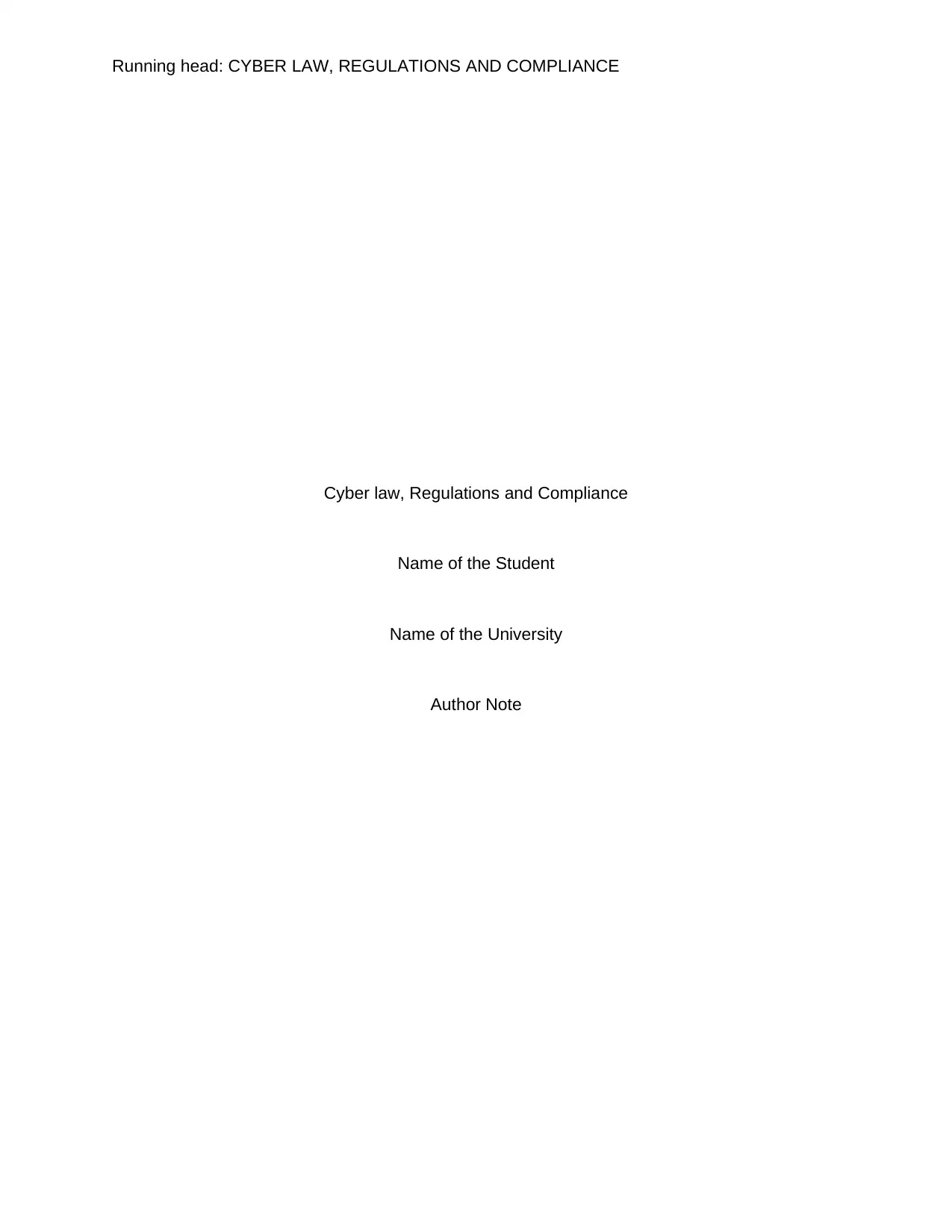
Running head: CYBER LAW, REGULATIONS AND COMPLIANCE
Cyber law, Regulations and Compliance
Name of the Student
Name of the University
Author Note
Cyber law, Regulations and Compliance
Name of the Student
Name of the University
Author Note
Paraphrase This Document
Need a fresh take? Get an instant paraphrase of this document with our AI Paraphraser
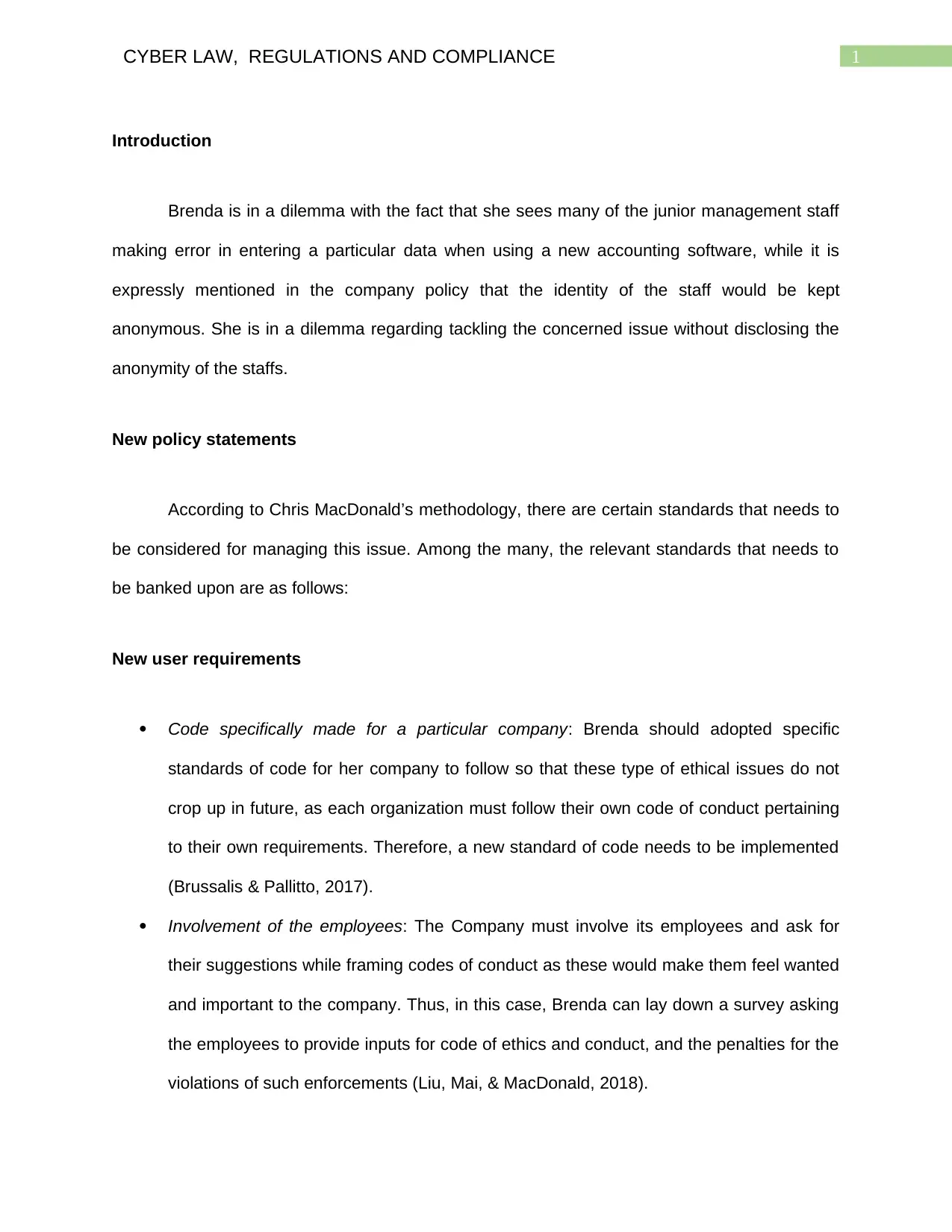
1CYBER LAW, REGULATIONS AND COMPLIANCE
Introduction
Brenda is in a dilemma with the fact that she sees many of the junior management staff
making error in entering a particular data when using a new accounting software, while it is
expressly mentioned in the company policy that the identity of the staff would be kept
anonymous. She is in a dilemma regarding tackling the concerned issue without disclosing the
anonymity of the staffs.
New policy statements
According to Chris MacDonald’s methodology, there are certain standards that needs to
be considered for managing this issue. Among the many, the relevant standards that needs to
be banked upon are as follows:
New user requirements
Code specifically made for a particular company: Brenda should adopted specific
standards of code for her company to follow so that these type of ethical issues do not
crop up in future, as each organization must follow their own code of conduct pertaining
to their own requirements. Therefore, a new standard of code needs to be implemented
(Brussalis & Pallitto, 2017).
Involvement of the employees: The Company must involve its employees and ask for
their suggestions while framing codes of conduct as these would make them feel wanted
and important to the company. Thus, in this case, Brenda can lay down a survey asking
the employees to provide inputs for code of ethics and conduct, and the penalties for the
violations of such enforcements (Liu, Mai, & MacDonald, 2018).
Introduction
Brenda is in a dilemma with the fact that she sees many of the junior management staff
making error in entering a particular data when using a new accounting software, while it is
expressly mentioned in the company policy that the identity of the staff would be kept
anonymous. She is in a dilemma regarding tackling the concerned issue without disclosing the
anonymity of the staffs.
New policy statements
According to Chris MacDonald’s methodology, there are certain standards that needs to
be considered for managing this issue. Among the many, the relevant standards that needs to
be banked upon are as follows:
New user requirements
Code specifically made for a particular company: Brenda should adopted specific
standards of code for her company to follow so that these type of ethical issues do not
crop up in future, as each organization must follow their own code of conduct pertaining
to their own requirements. Therefore, a new standard of code needs to be implemented
(Brussalis & Pallitto, 2017).
Involvement of the employees: The Company must involve its employees and ask for
their suggestions while framing codes of conduct as these would make them feel wanted
and important to the company. Thus, in this case, Brenda can lay down a survey asking
the employees to provide inputs for code of ethics and conduct, and the penalties for the
violations of such enforcements (Liu, Mai, & MacDonald, 2018).
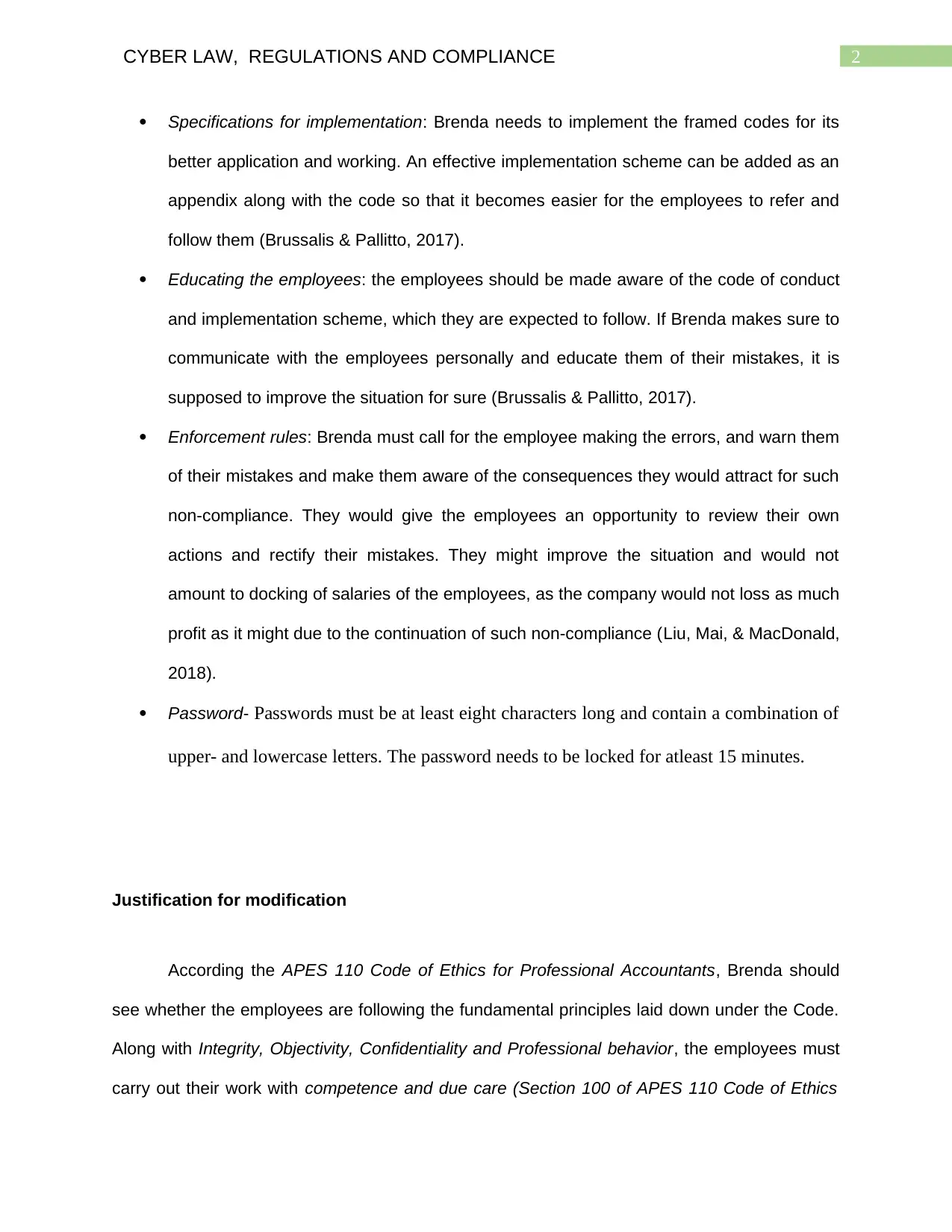
2CYBER LAW, REGULATIONS AND COMPLIANCE
Specifications for implementation: Brenda needs to implement the framed codes for its
better application and working. An effective implementation scheme can be added as an
appendix along with the code so that it becomes easier for the employees to refer and
follow them (Brussalis & Pallitto, 2017).
Educating the employees: the employees should be made aware of the code of conduct
and implementation scheme, which they are expected to follow. If Brenda makes sure to
communicate with the employees personally and educate them of their mistakes, it is
supposed to improve the situation for sure (Brussalis & Pallitto, 2017).
Enforcement rules: Brenda must call for the employee making the errors, and warn them
of their mistakes and make them aware of the consequences they would attract for such
non-compliance. They would give the employees an opportunity to review their own
actions and rectify their mistakes. They might improve the situation and would not
amount to docking of salaries of the employees, as the company would not loss as much
profit as it might due to the continuation of such non-compliance (Liu, Mai, & MacDonald,
2018).
Password- Passwords must be at least eight characters long and contain a combination of
upper- and lowercase letters. The password needs to be locked for atleast 15 minutes.
Justification for modification
According the APES 110 Code of Ethics for Professional Accountants, Brenda should
see whether the employees are following the fundamental principles laid down under the Code.
Along with Integrity, Objectivity, Confidentiality and Professional behavior, the employees must
carry out their work with competence and due care (Section 100 of APES 110 Code of Ethics
Specifications for implementation: Brenda needs to implement the framed codes for its
better application and working. An effective implementation scheme can be added as an
appendix along with the code so that it becomes easier for the employees to refer and
follow them (Brussalis & Pallitto, 2017).
Educating the employees: the employees should be made aware of the code of conduct
and implementation scheme, which they are expected to follow. If Brenda makes sure to
communicate with the employees personally and educate them of their mistakes, it is
supposed to improve the situation for sure (Brussalis & Pallitto, 2017).
Enforcement rules: Brenda must call for the employee making the errors, and warn them
of their mistakes and make them aware of the consequences they would attract for such
non-compliance. They would give the employees an opportunity to review their own
actions and rectify their mistakes. They might improve the situation and would not
amount to docking of salaries of the employees, as the company would not loss as much
profit as it might due to the continuation of such non-compliance (Liu, Mai, & MacDonald,
2018).
Password- Passwords must be at least eight characters long and contain a combination of
upper- and lowercase letters. The password needs to be locked for atleast 15 minutes.
Justification for modification
According the APES 110 Code of Ethics for Professional Accountants, Brenda should
see whether the employees are following the fundamental principles laid down under the Code.
Along with Integrity, Objectivity, Confidentiality and Professional behavior, the employees must
carry out their work with competence and due care (Section 100 of APES 110 Code of Ethics
⊘ This is a preview!⊘
Do you want full access?
Subscribe today to unlock all pages.

Trusted by 1+ million students worldwide
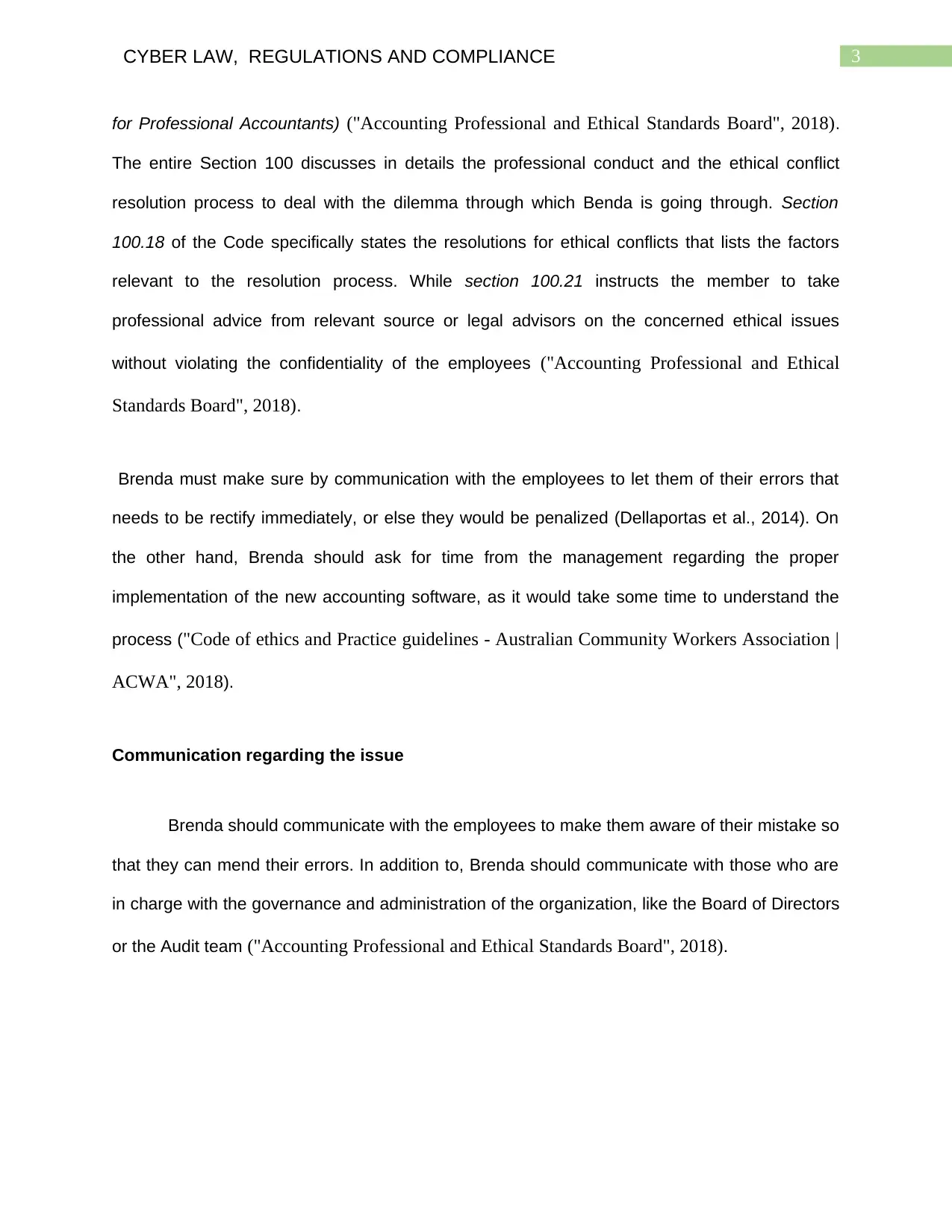
3CYBER LAW, REGULATIONS AND COMPLIANCE
for Professional Accountants) ("Accounting Professional and Ethical Standards Board", 2018).
The entire Section 100 discusses in details the professional conduct and the ethical conflict
resolution process to deal with the dilemma through which Benda is going through. Section
100.18 of the Code specifically states the resolutions for ethical conflicts that lists the factors
relevant to the resolution process. While section 100.21 instructs the member to take
professional advice from relevant source or legal advisors on the concerned ethical issues
without violating the confidentiality of the employees ("Accounting Professional and Ethical
Standards Board", 2018).
Brenda must make sure by communication with the employees to let them of their errors that
needs to be rectify immediately, or else they would be penalized (Dellaportas et al., 2014). On
the other hand, Brenda should ask for time from the management regarding the proper
implementation of the new accounting software, as it would take some time to understand the
process ("Code of ethics and Practice guidelines - Australian Community Workers Association |
ACWA", 2018).
Communication regarding the issue
Brenda should communicate with the employees to make them aware of their mistake so
that they can mend their errors. In addition to, Brenda should communicate with those who are
in charge with the governance and administration of the organization, like the Board of Directors
or the Audit team ("Accounting Professional and Ethical Standards Board", 2018).
for Professional Accountants) ("Accounting Professional and Ethical Standards Board", 2018).
The entire Section 100 discusses in details the professional conduct and the ethical conflict
resolution process to deal with the dilemma through which Benda is going through. Section
100.18 of the Code specifically states the resolutions for ethical conflicts that lists the factors
relevant to the resolution process. While section 100.21 instructs the member to take
professional advice from relevant source or legal advisors on the concerned ethical issues
without violating the confidentiality of the employees ("Accounting Professional and Ethical
Standards Board", 2018).
Brenda must make sure by communication with the employees to let them of their errors that
needs to be rectify immediately, or else they would be penalized (Dellaportas et al., 2014). On
the other hand, Brenda should ask for time from the management regarding the proper
implementation of the new accounting software, as it would take some time to understand the
process ("Code of ethics and Practice guidelines - Australian Community Workers Association |
ACWA", 2018).
Communication regarding the issue
Brenda should communicate with the employees to make them aware of their mistake so
that they can mend their errors. In addition to, Brenda should communicate with those who are
in charge with the governance and administration of the organization, like the Board of Directors
or the Audit team ("Accounting Professional and Ethical Standards Board", 2018).
Paraphrase This Document
Need a fresh take? Get an instant paraphrase of this document with our AI Paraphraser
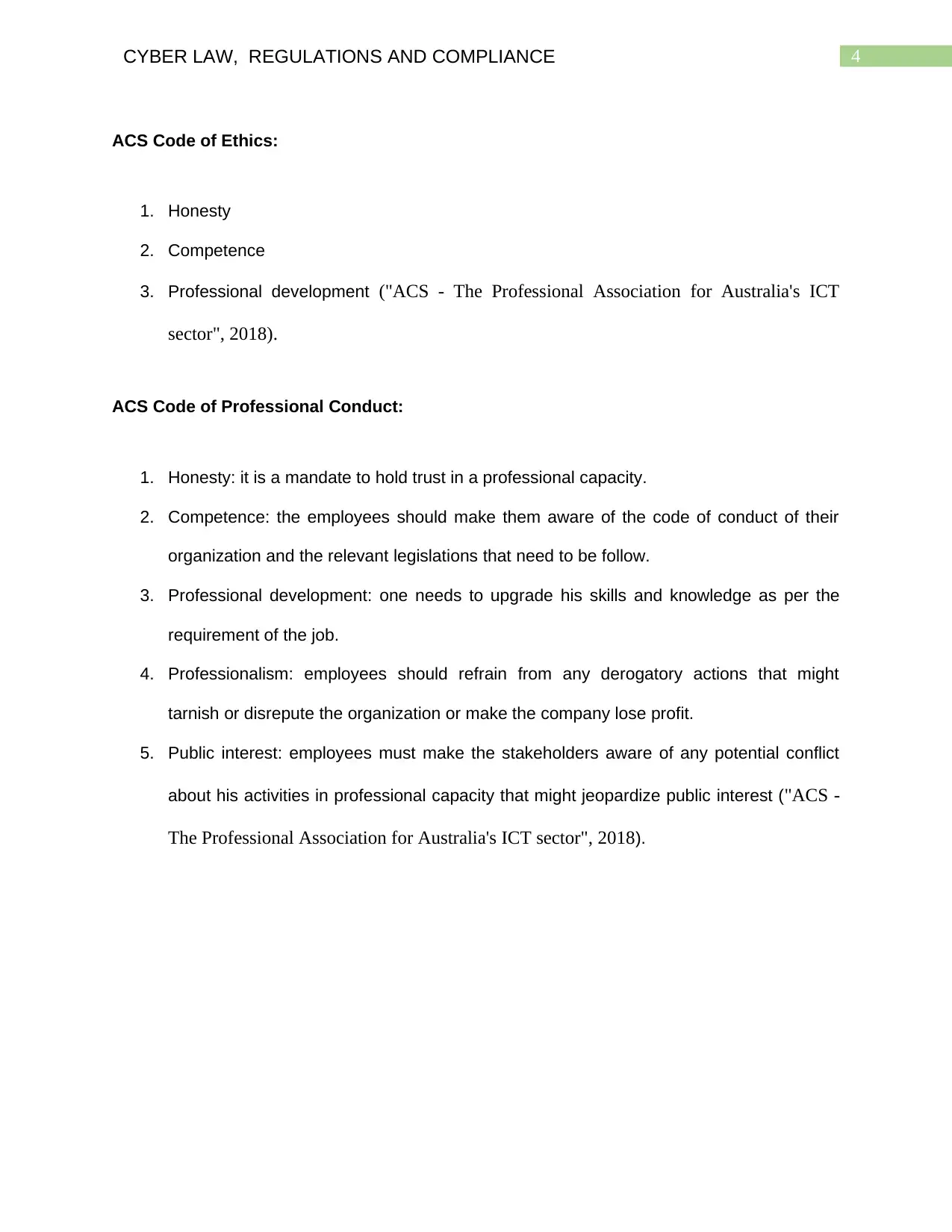
4CYBER LAW, REGULATIONS AND COMPLIANCE
ACS Code of Ethics:
1. Honesty
2. Competence
3. Professional development ("ACS - The Professional Association for Australia's ICT
sector", 2018).
ACS Code of Professional Conduct:
1. Honesty: it is a mandate to hold trust in a professional capacity.
2. Competence: the employees should make them aware of the code of conduct of their
organization and the relevant legislations that need to be follow.
3. Professional development: one needs to upgrade his skills and knowledge as per the
requirement of the job.
4. Professionalism: employees should refrain from any derogatory actions that might
tarnish or disrepute the organization or make the company lose profit.
5. Public interest: employees must make the stakeholders aware of any potential conflict
about his activities in professional capacity that might jeopardize public interest ("ACS -
The Professional Association for Australia's ICT sector", 2018).
ACS Code of Ethics:
1. Honesty
2. Competence
3. Professional development ("ACS - The Professional Association for Australia's ICT
sector", 2018).
ACS Code of Professional Conduct:
1. Honesty: it is a mandate to hold trust in a professional capacity.
2. Competence: the employees should make them aware of the code of conduct of their
organization and the relevant legislations that need to be follow.
3. Professional development: one needs to upgrade his skills and knowledge as per the
requirement of the job.
4. Professionalism: employees should refrain from any derogatory actions that might
tarnish or disrepute the organization or make the company lose profit.
5. Public interest: employees must make the stakeholders aware of any potential conflict
about his activities in professional capacity that might jeopardize public interest ("ACS -
The Professional Association for Australia's ICT sector", 2018).
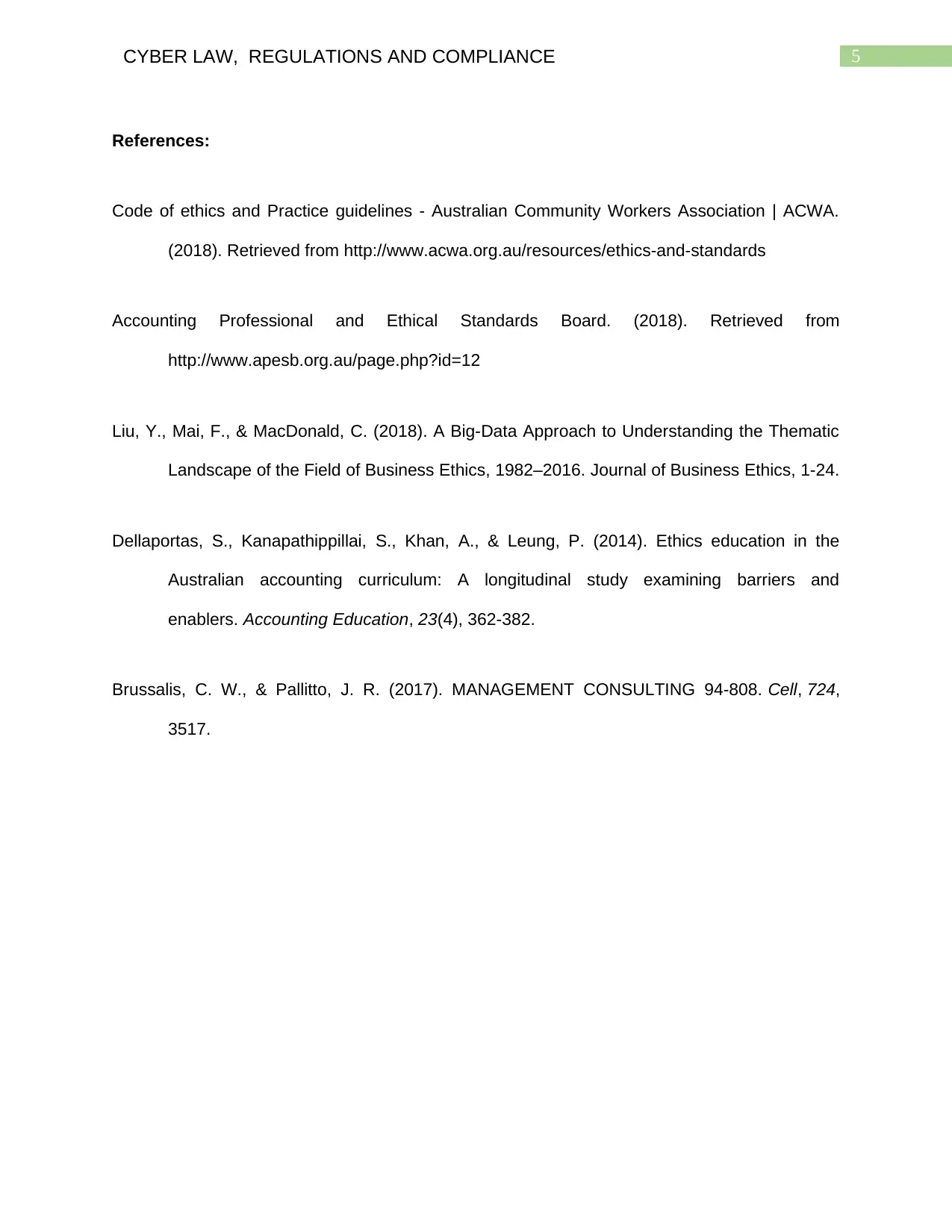
5CYBER LAW, REGULATIONS AND COMPLIANCE
References:
Code of ethics and Practice guidelines - Australian Community Workers Association | ACWA.
(2018). Retrieved from http://www.acwa.org.au/resources/ethics-and-standards
Accounting Professional and Ethical Standards Board. (2018). Retrieved from
http://www.apesb.org.au/page.php?id=12
Liu, Y., Mai, F., & MacDonald, C. (2018). A Big-Data Approach to Understanding the Thematic
Landscape of the Field of Business Ethics, 1982–2016. Journal of Business Ethics, 1-24.
Dellaportas, S., Kanapathippillai, S., Khan, A., & Leung, P. (2014). Ethics education in the
Australian accounting curriculum: A longitudinal study examining barriers and
enablers. Accounting Education, 23(4), 362-382.
Brussalis, C. W., & Pallitto, J. R. (2017). MANAGEMENT CONSULTING 94-808. Cell, 724,
3517.
References:
Code of ethics and Practice guidelines - Australian Community Workers Association | ACWA.
(2018). Retrieved from http://www.acwa.org.au/resources/ethics-and-standards
Accounting Professional and Ethical Standards Board. (2018). Retrieved from
http://www.apesb.org.au/page.php?id=12
Liu, Y., Mai, F., & MacDonald, C. (2018). A Big-Data Approach to Understanding the Thematic
Landscape of the Field of Business Ethics, 1982–2016. Journal of Business Ethics, 1-24.
Dellaportas, S., Kanapathippillai, S., Khan, A., & Leung, P. (2014). Ethics education in the
Australian accounting curriculum: A longitudinal study examining barriers and
enablers. Accounting Education, 23(4), 362-382.
Brussalis, C. W., & Pallitto, J. R. (2017). MANAGEMENT CONSULTING 94-808. Cell, 724,
3517.
⊘ This is a preview!⊘
Do you want full access?
Subscribe today to unlock all pages.

Trusted by 1+ million students worldwide
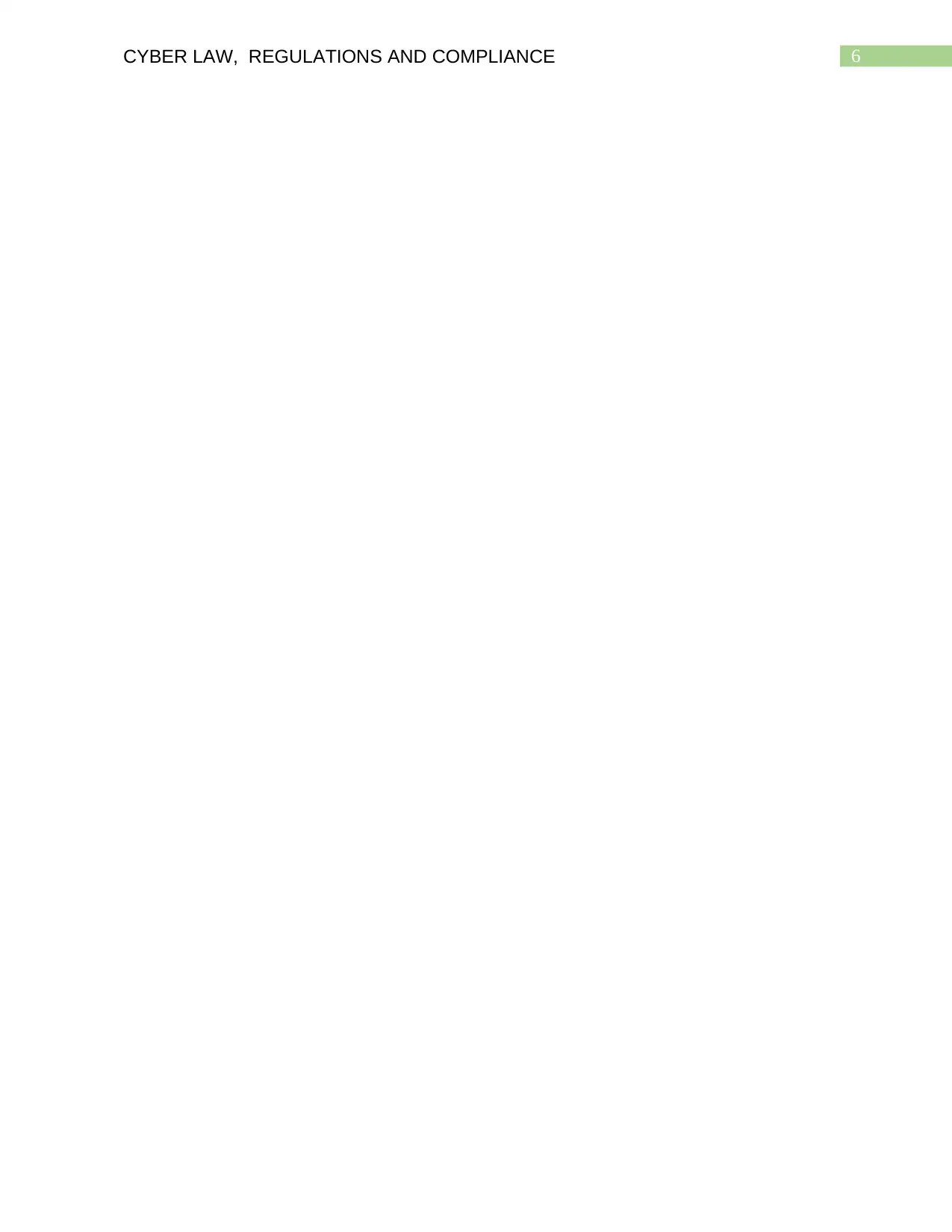
6CYBER LAW, REGULATIONS AND COMPLIANCE
1 out of 7
Related Documents
Your All-in-One AI-Powered Toolkit for Academic Success.
+13062052269
info@desklib.com
Available 24*7 on WhatsApp / Email
![[object Object]](/_next/static/media/star-bottom.7253800d.svg)
Unlock your academic potential
Copyright © 2020–2026 A2Z Services. All Rights Reserved. Developed and managed by ZUCOL.




